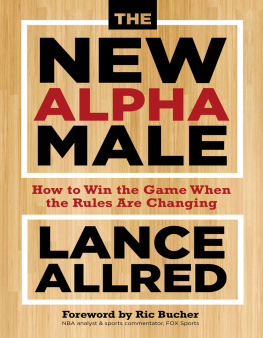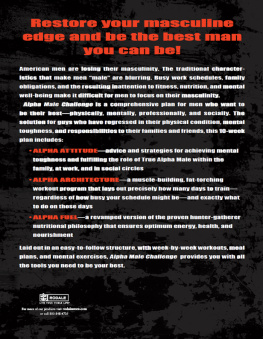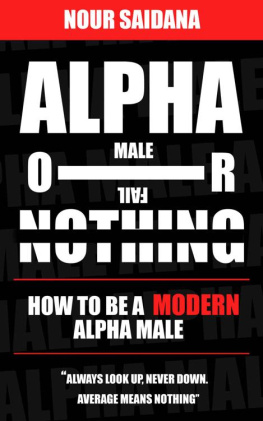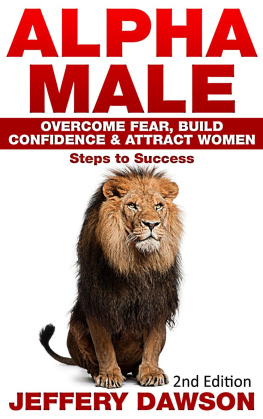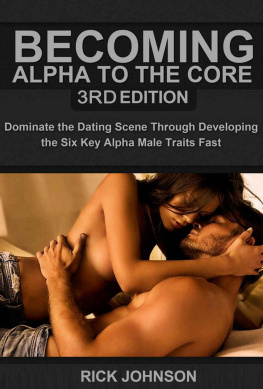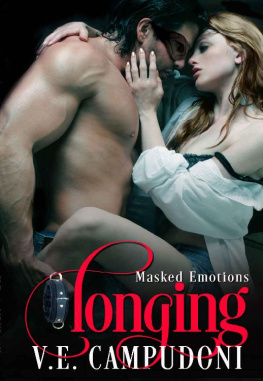Table of Contents
Guide

ACKNOWLEDGMENTS
There are many mentors who have helped me on this journey, and I would never have been able to find myself in a space to share this book were it not for them:
To my greatest hero, Hin-mah-too-yah-lat-kekt, Thunder Rolling Down the Mountain, or your English name: Chief Joseph. Thank you for guiding me on my path around the world, to follow in your footsteps of the peaceful warrior. I can only hope I have adequately honored you in some way.
Chief Walking Bear, Shaggy Llama, and the rest of my sundance family, thank you for showing me what it means to forgive.
Strong Eagle, thank you for walking the lonely path before me and showing me how to walk it in beauty.
Denise Lynch, thank you for always being there for me at the right moment, and also for holding space for me when I needed to grow on my own.
Christy Foster, thank you for walking this journey with me from our shared backgrounds, showing me through action that the best teachers are first and foremost the greatest students who never stop learning.
Jan Hull, thank you for showing me wonder and magic again, and for challenging me to truly step into my own and trust my heart.
Anita Whitworth, thank you for sharing your space with me on those sacred waters.
Robert Ohotto, thank you for showing me I can be woo-woo and a badass at the same time.
Sandra Ingerman, thank you for helping me finally see who and what I truly am, not just in this dimension, but in the many beyond.
Jennifer Brown, thank you for hearing my voice in the crowd and welcoming me to the Sounds True family.
Alice Peck, thank you for brilliantly honing and empowering my true authentic voice to come forward through your editing.
Thank you to all five of you brilliant conduits of the Great Spirit, who have mentored me from afar:
Norman Maclean, in showing me at an early age how to express myself through the written word.
Caroline Myss, in Sacred Contracts and your beautiful introduction of the Archetypes of our Psyches.
John Gottman, in your brilliant work on the Four Horsemen of Relationships.
Robert Glover, in your groundbreaking yet powerfully simple exposing of the nice guy in No More Mr. Nice Guy.
Wayne Dyer, in the many lonely nights in hotel rooms around the world that your books helped get me through.
Last to my parents, Vance and Tana, thank you for helping me raise Simon and for helping me rise from the ashes during the darkest time of my life.

This book is dedicated to my son, SimonSweet boy, may you always be bold.
CONTENTS
ALSO BY LANCE ALLRED
Longshot: The Adventures of a Deaf Fundamentalist Mormon Kid and His Journey to the NBA
The Pesaro Poems
Basketball Gods: The Transformation of the Enlightened Jock
How to Give the Million View TEDx Talk: What Is Your Polygamy?
I believe much trouble and blood would be saved if we opened our hearts more.
Attributed to Chief JosephHin-mah-too-yah-lat-kekt, or Thunder Rolling Down the Mountain
THE LIGHTS ARE SO BRIGHT. Brighter than the sun, or so it seems as I step up to the line to shoot my first free throw in the NBA in front of 16,000 people in Cleveland, Ohio. I take one dribble for rhythm and wind up to shoot like I have a hundred thousand times before, my brain and muscle memory set.
I look up to the rim with soft focus, never aiming, which was what allowed me to be a career 80 percent free-throw shooterrare for a big man. Whenever you are in your head and not your body, you miss. Aiming the shot is overthinking and kills flow and rhythm.
Stay in your body, I whisper to myself at the free-throw line; my first mistake as a small, insidious thought, pushes back: Is this it? Is this the best that it gets? Why dont I feel any different?
This thought is so sinisterly quiet that it is louder in my head than the rumble of the arena. Although I cant really hear ambient sound, I feel it, yet my internal question is louder as it asks again, Is this it?
I am rattled. I take my shot, and the mechanical process of muscle memory is off as my brain short-circuits. The ball launches in an awkward push with no backspin. I follow the ball with my eyes as it sails past the rim and hits the backboard, caroming into the hoop.
Bank.
My first point in the NBA was an unintentionally banked-in free throw off the glass. Most people thought I had done so on purpose, since I was a bank-shot expert and had even won the H-O-R-S-E Trophy with a variety of bank shots a month earlier at NBA All-Star weekend in New Orleans, Louisiana, as a D-League Star. The bank shot is a lost art. Some might call it boring, relying on the backboard to carom your ball into the hoop. To me it is beautiful, namely for its simplicity. But I never banked my free throws.
My new teammates laughed and patted me on the back, yet I wasnt laughing.
What happened at the free-throw line? Was it nerves? That was an easy explanation, but the truth is it was the voice in my head pointing out how the illusions of worldly success I had chased for so long were in fact hollow, and how unfulfilled I still felt in my heart.
Sure, my ego was happy. I was in the NBAbragging rights, yo.
Yet in my heart all I felt was fear.
Fear that I wasnt enough.
Fear that this new job, my contract, my stability might be taken away from me. The same fear that so many of my teammates on the Cleveland Cavaliers were feeling as well: fear that we were expendable, fear that if we lost this job, we would have no value to the world. Depression set in.
Yes, there I wasin the NBA, a lifelong dream for so many, and I was hit with depression. Because if the NBA and those bright lights couldnt make me happy, what could?
My depression resulted in a near suicide attempt within the year, following the 2008 recession when I, like so many other players in the league, was released by the Cleveland Cavaliers due to budget concerns.
As I slowly recovered from that nervous breakdown, I had a choice:
Does the hero fall to hubris and stubbornness, unwilling to heed the lesson?
Or does the hero transcend and transform?
I chose to adapt. I chose to rebound. I chose transformation.
I changed so many thingsnot just my thoughts, values, how I measured success, or the stories that fueled my fears, but most importantly, I began to challenge my logic that drove said values, stories, fears. Logic that said my worth as a modern American man was contingent on external trophies.
I made that commitment in 2009.
I wrote this book a decade later.
It took me ten years of transformationthe daily grind and grueling work of internal accountability and reflectionas I traveled the world playing basketball on every continent except Antarctica to reach the point where I could write this book. I did not go live in a vegan commune to withdraw from life, leaving my responsibilities behind. Rather, I chose accountability, and faced my life head-on as I ended my basketball career, went through a divorce, and became a single father.
I chose to adapt. I chose to rebound. I chose transformation.
Transformation is perseverance. It is grit.
How did I transform?
By returning to the basics and fundamentals my great coaches taught me and looking at them from a fresh angle while relying on my core play that carried me for ten years as a professional basketball player:
Next page
